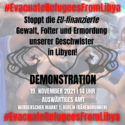Tag: Mediterranean
-

Demo – #Evacuate refugees from Lybia, 19.11.2021, 14 Uhr, Auswärtiges Amt, Berlin
von United4Eritrea (1) Deutsch (2) Français (3) Arabic (4) Somali (5) Tigrinya ((6) English) (1) [Deutsch] Stoppt die EU-finanzierte Gewalt, Folter und Ermordung unserer Geschwister in Libyen – seid solidarisch und kommt zahlreich! Demonstration, 19. November 2021 | 14 Uhr, Auswärtiges Amt, Werderscher Markt 1, Berlin (Bärenbrunnen) Anfang Oktober 2021 kam es in Tripoli zu…
-
Gedenkkundgebung für 130 Menschen, Opfer des europäischen Grenzregime im Mittelmeer, Oranienplatz, 29.April, 18.30 Uhr
Am 22. April bekommen wir, vom Alarmphone, die Nachricht, dass 130 Menschen im Mittelmeer ertrunken sind. Wir hatten die lybische und die europäischen Küstenwachen viele Stunden im Voraus informiert. Sie haben sich geweigert zu handeln. Eine Woche später wollen wir in Wut und Trauer auf die Straße gehen, um den Ertrunkenen zu gedenken. Europe, your…
-
Aufruf: Demonstrieren für sichere Häfen am 07.07. in Berlin!
Menschen auf dem Mittelmeer sterben zu lassen, um die Abschottung Europas weiter voranzubringen und politische Machtkämpfe auszutragen, ist unerträglich und spricht gegen jegliche Humanität. Migration ist und war schon immer Teil unserer Gesellschaft! Statt dass die Grenzen dicht gemacht werden, brauchen wir ein offenes Europa, solidarische Städte, und sichere Häfen. Seehofer, Salvini, und Kurz nutzen…
-
Filmscreening “La vie en Europe / Life in Europe” by Oumar Assoumane Aghali
6. April // 19:00 // Club, Werkstatt der Kulturen, Wissmannstr. 32, Berlin-Neukölln (U Hermannplatz) Oumar Assoumane Aghali est réalisateur et militant pour les droits des réfugié.e.s à Berlin. Ses court-métrages racontent la traversée de la Méditerranée et la vie à l’intérieur du mouvement de lutte des réfugié.e.s à Berlin. Oumar Assoumane Aghali is a film…
-
Moving on – 1 Year Alarmphone
The one year anniversary brochure of the alarm phone is out! This brochure provides information and an evaluation of the dynamics, not merely for the Aegean region but also concerning conditions and social struggles in the Central and Western Mediterranean Sea. The different contributions in this brochure reflect on many remarkable experiences made by Alarm Phone members in…
-
Ferries not Frontex! 10 points to really end the deaths of migrants
On April 20, the Joint Foreign and Home Affairs Council of the EU released a ten-‐point action plan outlining their response to the recent deaths of migrants in the Mediterranean Sea. Many other proposals have also been made over the last few days. We are activists who have been involved in the struggles against the…